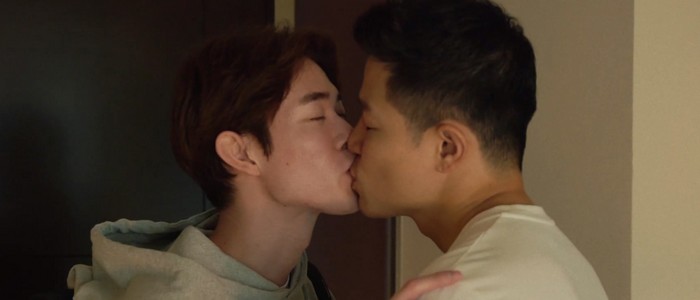
Egoist is a Japanese BL movie about a couple who recently met and started dating. However, they face financial troubles. While the main character can afford luxury brands, his partner struggles to make a decent income to support his mother. Despite the expensive gifts, their relationship becomes strained. As the protagonist examines the situation, he discovers a shocking secret about his boyfriend.
Many BL fans will enjoy the first half of Egoist, which portrays a captivating romance. From steamy shower sex to intimate relationship moments, the couple displays passionate desire. Both leads give authentic performances, bringing vulnerability to their roles. The movie's second half suddenly shifts to a gloomy tone, which may lose your enthusiasm. However, the thoughtful story lingers in my mind as it explores intriguing themes about love.
Egoist Summary
Title:
エゴイスト
Movie Info:
Japan (2022)
Genre:
Romance
About:
Egoist is a sad & emotional film.
Is Egoist BL?
Yes, Egoist includes a gay romance.
Plot
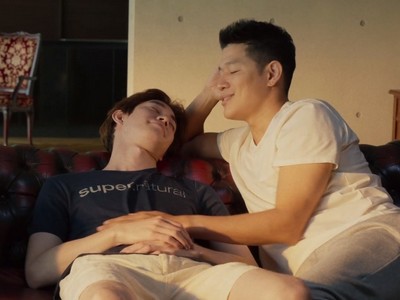
Kosuke is a single gay man who works as a fashion editor. He projects an air of confidence. Deep down, he is insecure and has a chip on his shoulder. As a teenager, the other kids bullied him due to his sexuality. Now, Kosuke flaunts his successes to those who made fun of him. He loves wearing luxurious designer brands, treating them as prestigious symbols of his status. These clothes are like his armour from other people's harsh judgment.
Kosuke had a close relationship with his mother, who protected him from the bullies. However, she passed away from illness when he was a teenager. Kosuke has a cold relationship with his father and barely talks to him. At eighteen, he moved away from his rural hometown and lived in the city. Each year, he returns home on his mother's death anniversary. He pays respects to her memorial shrine. Kosuke keeps communications with his dad to a minimum. His father still doesn't know Kosuke is gay.
Kosuke is close to a group of gay friends and hangs out with them frequently. While chit-chatting, they discuss working out and getting back in shape. One of Kosuke's buddies recommends a young personal trainer who has just started this profession. This trainer is also gay. An interested Kosuke obtains Ryuta's contact information and becomes his regular client. Ryuta is sincere about fitness. He advises Kosuke on workouts and nutrition plans.
Kosuke and Ryuta get to know each other better. Ryuta reveals he is a high school dropout, working part-time to help support his single mom. Ryuta doesn't have much money and hesitates when buying a gift for her. Kosuke senses his companion's goodness and offers to purchase the expensive present. Initially, Ryuta refuses his client's generosity, but Kosuke insists on treating his trainer. Feeling grateful, Ryuta initiates a spontaneous kiss. The two men head to Kosuke's lofty apartment and make love for the first time. After discovering their sexual compatibility, Ryuta and Kosuke begin a romantic relationship.
Kosuke and Ryuta continue seeing each other. The two lovebirds have lots of sex. After every visit, Kosuke buys a fancy gift for his boyfriend's mother. Ryuta feels embarrassed and tries to reject these gifts. Kosuke insists on being generous. Soon, Kosuke falls madly in love. He gushes to his friends about his blissful relationship. However, Ryuta feels increasingly discontent. During one of their house visits, Ryuta reveals the concerns on his mind. Kosuke is shocked to hear what his boyfriend has to say.
Egoist Movie Trailer
Egoist Cast
Characters
Kosuke
Ryohei Suzuki (鈴木亮平)
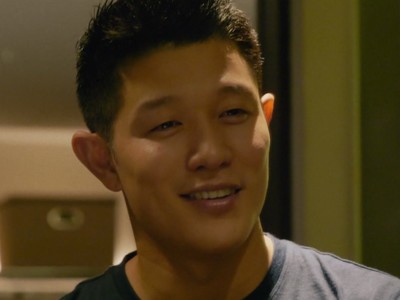
Kosuke is a single gay man who works as a fashion editor. He wears luxury brands and likes flaunting his successes. The fancy clothes are like his armour, disguising his insecurities after being bullied in his teens. Kosuke used to have a close relationship with his mother, who died from an illness. In contrast, he barely talks to his dad. After relocating from his rural hometown, Kosuke lives alone in a lofty city apartment.
Ryohei Suzuki

Ryohei Suzuki (鈴木亮平) is a Japanese actor. He is born on Marh 29, 1983. His first BL project is the 2022 movie, Egoist.
Ryuta
Hio Miyazawa (宮沢氷魚)
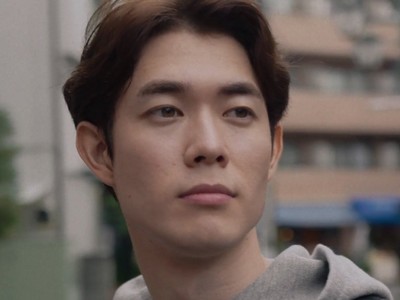
Ryuta is a part-time personal trainer in his mid-20s. He started this profession recently. However, he is passionate about fitness and nutrition. Ryuta has long-term prospects for this career. Ryuta lives with his single mom and supports her financially. He is frugal with money and hesitates before buying a gift. After Ryuta becomes Kosuke's personal trainer, the two men become physically and emotionally intimate.
Hio Miyazawa

Hio Miyazawa (宮沢氷魚) is a Japanese actor. He is born on April 24, 1994. His first BL project is the 2020 movie, His. He is the lead is the 2022 film, Egoist.
Supporting Cast
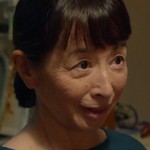
Taeko
Sawako Agawa (阿川佐和子)
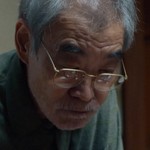
Yoshio
Akira Emoto (柄本明)

Shizuko
Yuko Nakamura (中村優子)
Cast Highlights
- Ryuta's actor (Hio Miyazawa) is the lead actor of the 2020 Japanese BL movie, His.
- For his role in Egoist, Hio Miyazawa won in the Best Supporting Actor category in the 2023 Asian Film Awards. His costar (Ryohei Suzuki) was also nominated for the Best Actor category.
Egoist Review
Review
Movie Review Score: 8.7
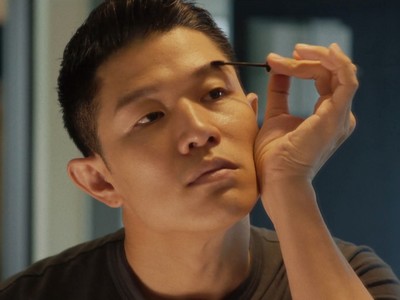
Egoist begins with a whirlwind romance. BL fans will enjoy watching the leads meet and quickly fall in love. Their sexual tension bursts alive in intimate exchanges, fuelled by passionate desire. And then, the melodrama starts. The story peels away the façade of the blissful relationship, revealing gritty conflicts beneath the surface. The rest of the film is an intense rollercoaster. Contrary to its deceptively simple start, Egoist explores complex themes and ambiguous emotions in a poignant narrative.
Early on, Egoist makes a bold impression because of its explicit sexual encounters. Get ready to see the two attractive leads strip naked and squeal with orgasmic delight. They continue having steamy exchanges in many different places and positions, from the shower to the duvet. As their relationship develops, the movie shifts its focus and highlights a heartfelt connection. Beyond having sex, the couple settles comfortably into each other's lives. Egoist paints a multifaceted romance, acknowledging the importance of both physical and emotional intimacy.
Money complicates the love story. The materialistic Kosuke affords expensive presents for Ryuta, who accepts his boyfriend's generosity with a heavy heart. Each gift becomes increasingly extravagant, almost like Kosuke is a sugar daddy. The movie scrutinizes the nature of these exchanges. Is Kosuke supporting his partner out of selfless benevolence? Or is he imposing his ego and using wealth to buy Ryuta's affection? Egoist is an intriguing film since it doesn't define the protagonist's motivations. It leaves enough doubt to make viewers interpret his intentions.
Egoist is supported by a talented, award-winning cast. Kosuke's actor (Ryohei Suzuki) carries the film with a commanding presence. This versatile performer can adapt to various scenarios, from bantering with friends to emoting in dramatic exchanges. He shows measured restraint and reacts appropriately based on the situation. His costar (Hio Miyazawa) exhibits an angelic innocence. He appears so warm and sincere, adding to Ryuta's genuine charm. Both leads deserve kudos for their uninhibited approach to the erotic scenes, which are gutsy and glorious.
I prefer the movie's first half, which centres on the couple's fascinating relationship dynamics. As a BL watcher, the gay love story appeals to me the most. The second half becomes gloomier and deviates from the romance, losing my enthusiasm. I'm not fond of the sudden plot developments, which feel contrived. Egoist resembles a cliched melodrama by inflicting needless misfortune onto the protagonists. Despite my annoyance, I recognize meaningful themes in the new narrative. Kosuke's sentimental character arc gives the film more emotional depth and nuance.
Egoist has a sad ending for Kosuke, who puts on a brave face despite his devastating circumstances. My favourite scene is when he stares into the mirror reflection, showcasing both his strength and fragility. Initially, the movie didn't wow me. However, the thoughtful story lingers in my mind after finishing it. As I rewatch various scenes and ponder over the characters, my admiration for this film grows. I appreciate the sensational performances, sophisticated messages, and subtle metaphors. Egoist offers more than just romance and speaks profoundly about love.
Summary
Poignant story
Egoist explores a couple's whirlwind romance and fascinating relationship drama. Later, the story becomes gloomier. The poignant narrative examines sophisticated messages about love.
Steamy romance
The movie contains many steamy sex scenes and bonding moments, highlighting the couple's physical and emotional intimacy. However, the film's second half deviates from the romance.
Powerful acting
Kosuke's actor (Ryohei Suzuki) carries the film with a versatile range and a commanding presence. His costar (Hio Miyazawa) radiates warmth, sincerity, and angelic innocence.
Sad ending
Egoist has a sad ending for Kosuke, who must put on a brave face amid devastating circumstances. The last scene is poignant. Contrary to the film's title, Kosuke shows sensitivity and selflessness.
Intimate artistry
The movie creates a raw, intimate atmosphere with many close-ups and shaky handheld camera movements. The sex scenes are also filmed explicitly, highlighting the couple's passion.
87%
Egoist is a poignant movie that explores complex relationship drama with sensitive emotions. Both actors give award-winning performances as they portray a passionate and sensual romance.
Egoist Movie Explained
Analysis
- Attraction
- Generosity
- Kosuke & Ryuta
- Materialism
- Secret
- Purchase
- Workload
- Ownership
- Ego vs love
- Guilt
- Ryuta's mom
- What is love?
Attraction
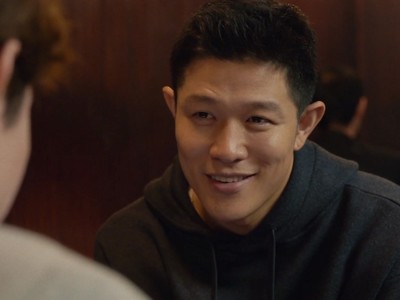
Egoist begins by teasing an instant attraction between the lead characters. The sexual tension is brewing during their first meeting at the gym. Ryuta compliments his client's physique, while Kosuke praises his personal trainer's handsome looks. The movie also shows them doing physical workouts with intimate body contact. During a stretch, Ryuta places a hand near Kosuke's buttocks. The camera focuses on close-up shots of their body parts, adding to the suggestiveness of their relationship.
After the workout, Kosuke and Ryuta sit down to chat. They get to know each other better. Ryuta talks enthusiastically about his aspirations for a full-time personal training career. He smiles cutely afterward. "That's amazing!" Kosuke flatters him. Okay, let's be honest. Ryuta's plans aren't that impressive. However, Kosuke is in a flirtatious mode and wants to appear agreeable. During their exchange, Kosuke stares and smirks at Ryuta with desire written all over his face. Oh my god, that is a look of hungry craving! Kosuke's expression screams: "I want a piece of this man!"
Beyond his angelic appearance, Ryuta also has an adorable personality. When he hits his head on the counter, his clumsiness seems strangely endearing. It shows him with his defences down, like Ryuta is just being his awkward and genuine self. Furthermore, Ryuta wants to buy a gift for his mom, a sentiment that indicates his thoughtfulness. These lovable qualities make Kosuke even more smitten with his partner. He describes Ryuta as "innocent", "pure", and "a good kid". A large part of Ryuta's appeal is his earnestness. Kosuke likes him for his sincere heart.
Generosity
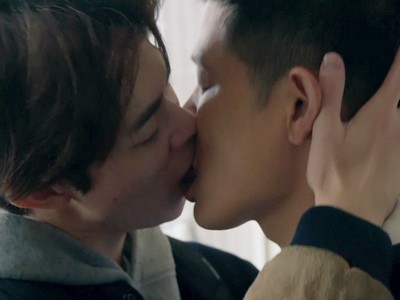
Ryuta comes from a poor household and must work multiple jobs to support his single mom financially. Despite being strapped for cash, Ryuta insists on paying the restaurant bill. This gesture reveals several aspects of his character. One, he doesn't want to mooch off his wealthy client. Even though Kosuke has a higher income, Ryuta won't shift the economic burden onto him. And two, it demonstrates Ryuta's pride. He cherishes his ability to support himself without relying on someone else to pay his expenses.
In their next meeting, Kosuke buys the expensive souvenir that Ryuta couldn't afford previously. His actions stem from generosity. Kosuke sees his companion struggling with money, so he offers his support. Ryuta looks troubled and declines the gift. Yet, Kosuke asserts his dominance. Ryuta is in an awkward position where turning down his client seems rude or offensive. He reluctantly accepts the present, despite never asking for this charity. It marks Kosuke's first instance of imposing his will onto Ryuta, raising questions about the power dynamics in their relationship.
Although inconvenienced, Ryuta feels thankful for Kosuke's generosity. He rewards his partner with a spontaneous kiss. However, he clarifies his affection doesn't come from buying him a gift. Fair enough. They shared a mutual attraction from the get-go. Kosuke's thoughtful gesture strengthens Ryuta's budding feelings. The couple heads to the loft, where they continue making out. Suddenly, the camera pans down to the gift bag in Ryuta's hand. Despite Ryuta's claims, the storyteller makes us wonder how much Kosuke's present may have influenced this romance.
Kosuke and Ryuta
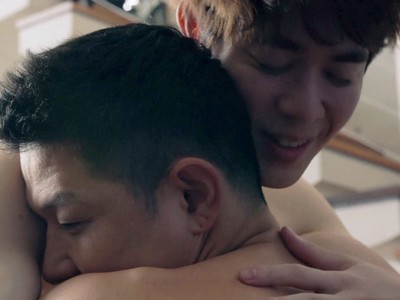
Kosuke and Ryuta are sexually compatible. Egoist makes a deliberate choice to highlight the couple's versatility. Kosuke begins in a submissive position during the first encounter, yet he switches to a dominant role in the next scene. Their fluidity shows a balanced dynamic, not restricting either partner to strictly tops and bottoms in their sexual experiences. The open-minded arrangement indicates their reciprocal love. You give, but you also get to receive.
Ryuta leaves Kosuke's apartment after a wild day of sex. The couple only said goodbye moments ago. Yet, Kosuke heads to the balcony to watch Ryuta's departure. Similarly, Ryuta turns around and glances back. They spot one another and wave enthusiastically. This scene highlights the depth of their romantic feelings. Despite spending hours of intimacy together, Kosuke and Ryuta still search for each other from a far distance. Once again, the story highlights a reciprocal connection. It's not just a one-sided love. Both protagonists seem equally smitten in their new relationship.
Kosuke continues to give presents to his boyfriend. Ryuta declines, but Kosuke insists until his partner accepts. It has become a disturbing pattern. Kosuke invites Ryuta over for sex and sends him off with a parting gift, like a bartering transaction. Since Ryuta doesn't have money to afford anything, he can only repay his boyfriend with physical affection. "Thank you for taking care of me." Ryuta accepts the gift bag and returns a polite kiss. Yet, there's an underlying tension. This relationship is no longer reciprocal because their power dynamics seem imbalanced.
Materialism
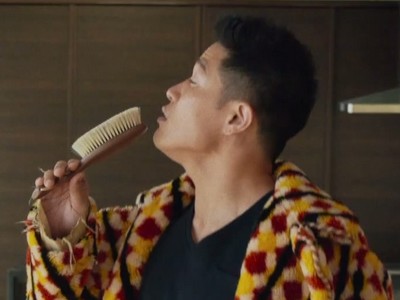
Kosuke doesn't see anything wrong with buying presents for his boyfriend. Like flowers or chocolates, these gifts are a token of his appreciation. Kosuke assigns much value to material possessions in his everyday life. He lives in a lofty apartment, wears fancy designer brands, and collects high-end accessories. While Kosuke isn't rich, he earns a decent job salary. Kosuke also doesn't have to raise his parents or dependents, so he has disposable income to spare.
Kosuke's materialism comes from his upbringing. During his teenage years, he faced bullying because of his sexuality. The mistreatment drove Kosuke to prove his worth and gain validation. As an adult, he wants to project an image of confidence. Kosuke struts around in an expensive wardrobe, flaunting his status, success, and sophistication. Unlike his former bullies in their drab uniforms, he appears glamorous. Kosuke calls these clothes his armour because they empower him. Designer labels conceal his insecurities and protect him from inferiority.
Kosuke places so much significance on material wealth that he misconstrues it as a currency for love. He dotes on his boyfriend lavishly and assumes Ryuta would appreciate the generosity. Yet, Ryuta feels burdened by the extravagance. Kosuke offers another gift bag and says, "You should be used to it by now." Ryuta responds by breaking up with him. Typically, you don't end a relationship over your boyfriend's presents. However, Ryuta feels pressured since each gift carries an emotional obligation. It triggers Ryuta's guilt because he isn't faithful to his lover.
Secret
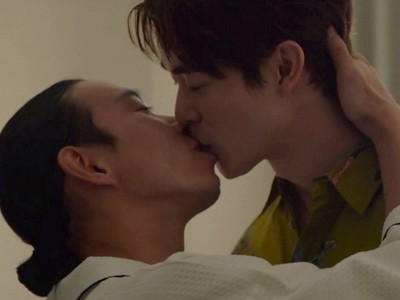
During the breakup, Ryuta reveals he secretly works as an escort. Since dropping out of high school, he has been sleeping with other men for money. With many years of experience, he is a professional sex worker! The revelation may seem startling, but the movie includes foreshadowing in earlier scenes. Notice Ryuta's vagueness when Kosuke asks about his work. He only describes it as "a late-night part-time job". Well, that's one way of phrasing his career…
Ryuta's secret profession goes against the image of wholesomeness that Kosuke imagined about his boyfriend. In an earlier scene, Kosuke complained about Ryuta being too gentle during sex. Yet, the movie shows Ryuta screwing his clients rigorously. During one exchange, he lifts an older man by his legs before entering him. The visual is eerily similar to Ryuta & Kosuke's first sexual encounter. It's almost the same position, except Ryuta replaces Kosuke with another partner. Egoist highlights the discrepancy between reality and the fantasy that Kosuke created in his mind.
Ryuta makes a steady income as a sex worker, enough to support his household financially. However, his career is incompatible with dating. Maybe other escorts can separate their love life from their work, but not Ryuta. He feels tormented about sleeping with clients while developing feelings for Kosuke. Every generous gift bag reminds Ryuta he cheats on a loyal boyfriend who dotes on him. His guilt interferes with both worlds. Although Ryuta wants to be with Kosuke, he needs an income to survive. Ryuta decides to break up, sacrificing his love for money.
Purchase
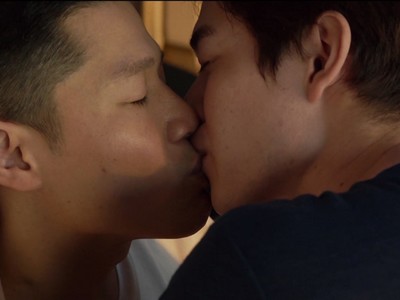
"Let me buy you." Kosuke states one of the most memorable lines in the movie. He offers to be Ryuta's exclusive client, paying him a monthly stipend. The money isn't enough to cover all of Ryuta's living expenses. He'd still need to work part-time to make up the difference. However, this compromise allows him to quit escorting and enjoy a long-term relationship with his boyfriend. Contrary to Ryuta's belief, financial stability and a fulfilling love life can coexist. "Let's work hard together," Kosuke persuades him.
Buying someone is an ugly term with negative connotations. A more appropriate phrase would be providing financial support. The vocabulary is an important distinction due to the different intentions. Kosuke gives away his money, not expecting any service in return. He isn't a sugar daddy looking for sexual favours. The movie purposely stops showing sex scenes to convey that Ryuta no longer exchanges his body for money. Kosuke's so-called purchase is a charitable act in disguise. He provides financial aid to his struggling boyfriend and helps him make ends meet.
The couple's arrangement comes with a consequence. By accepting a monthly allowance, Ryuta is indebted to his benefactor. Kosuke gives up his hard-earned savings to support his lover unconditionally. "I'll repay this money," Ryuta tells him after receiving the first payment, even though Kosuke never insisted. Ryuta places implicit pressure on himself. Some people gladly receive free handouts, but not him. He feels obligated to work hard, earn an income, and reach financial independence. Ryuta's primary motivation is to stop becoming Kosuke's burden.
Workload
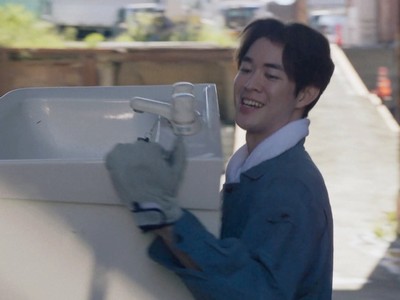
Ryuta finds new employment. For his day job, he transports heavy appliances in junkyards. The manual labour seems physically exhausting. During the night shift, he does kitchen chores at a restaurant. Although not as demanding, the second job takes away his time to rest and recuperate. The movie juxtaposes Ryuta's strenuous workload with Kosuke's leisurely fashion photoshoots. Although Kosuke says "let's work hard together", Ryuta's contributions require more effort.
Escorting wasn't glamorous, but this job paid well and seemed relaxing. Despite the stigma, Ryuta admitted he was happy doing the work for many years. Yet, he gave up the comfortable and lucrative profession to appease Kosuke. Likewise, Ryuta aspired to be a full-time personal trainer, but he stopped working at the gym to accommodate his schedule. He must put his ambitions on hold. Ryuta makes sacrifices to maintain the relationship with Kosuke. Otherwise, he'd still be an escort instead of his new career choices.
In some capacity, Ryuta's autonomy has diminished. Rather than making the best choices for himself, he considers Kosuke's feelings first. To clarify, Kosuke never orders his partner to obey. No one forces Ryuta to do anything against his will. However, there's a subliminal pressure that affects his decision-making process. Kosuke imposes an unwitting influence on Ryuta, who alters his entire lifestyle for his boyfriend. Not all the changes are necessarily positive. Kosuke's love is like an emotional workload, weighing heavily on Ryuta's heart.
Ownership
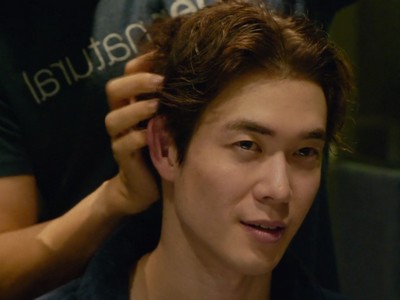
Kosuke's lavish gifts continue. In addition to the monthly allowances, he gives away a fancy jacket to his boyfriend. Ryuta declines the freebie as usual, but Kosuke easily convinces him. "Clothes are happy when people wear them," he insists. It seems more like Kosuke is happy when Ryuta wears his clothes. Kosuke never consults his partner on whether he wants these presents. He imposes his choices and expects Ryuta to accept them. Kosuke reminds me of buying accessories for a Barbie doll. Here's a new outfit I picked for you to wear!
Kosuke's next gift is a vehicle. Once again, there's the usual routine of Ryuta refusing the present before Kosuke persuades him to accept it. The car ownership marks another attempt to exert control over Ryuta. Kosuke has an invasive influence on many aspects of his boyfriend's life. You must drive my car, wear my clothes, and spend my money. The subliminal message is you belong to me. Kosuke almost treats Ryuta like a personal possession, echoing his past sentiment of "let me buy you". Ryuta loses his autonomy and becomes an extension of Kosuke.
I put a sinister spin on Kosuke's behaviour for dramatization. However, there are many positives to his generosity, which shouldn't go overlooked. Ryuta loves the jacket and feels grateful for the financial support, especially after his mom's hospitalization. Kosuke's gifts also don't come from a place of manipulation. He wants to take care of Ryuta and make his life better. Intrinsically, Kosuke's benevolence is selfless. Yet, there's a subtle self-gratification behind every present. Driven by his ego, Kosuke believes he can buy Ryuta's affection with material wealth.
Ego vs love
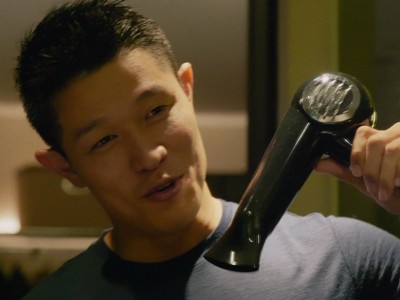
An egoist describes someone who puts their self-interest ahead of others. The movie's central intrigue is determining Kosuke's motivations. Does his generosity come from loving Ryuta, or is he more driven by making Ryuta love him? Let's use the car as an example. Does Ryuta really need a new vehicle? Or is this a lavish gift that Kosuke buys to feel better about himself, believing it would make Ryuta happy? Kosuke replaces purchasing designer labels with presents for his boyfriend as a means of self-gratification.
Egoist includes moments that highlight Kosuke's tenderness toward Ryuta. The hair-drying scene contains a simple conversation between the lovers. As Kosuke blow-dries his boyfriend's hair, he asks rhetorically, "Does it feel comfortable? It feels great to have someone help you, right?" Ryuta flashes a faint smile and agrees. This scene is a metaphor for their relationship dynamic. Kosuke enjoys caring for his partner and making his life cozy. By the same logic, spending money on gifts may also be a part of Kosuke's nurturing personality. That's his way of expressing love.
In their final exchange, Ryuta asks his boyfriend, "Do you like me?" Surprisingly, he seems unsure about the authenticity of Kosuke's feelings. His question echoes the ongoing theme of whether Kosuke is motivated by genuine love or self-interest. Egoist wants viewers to interpret Kosuke's incentives in this relationship. Maybe you're optimistic and believe Kosuke does everything out of selfless devotion. Stop doubting him! He only wants to support his partner! Or you may feel cynical and suspect Kosuke is self-centred. His love is rooted in an egocentric desire.
Guilt
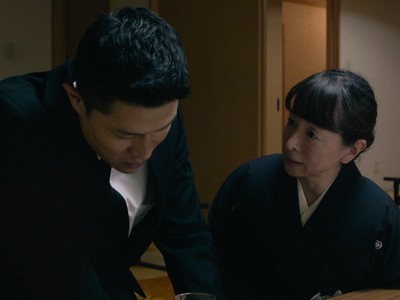
Ryuta dies midway through the movie. He overexerts himself by working two part-time jobs and not getting enough rest. As a result, his body collapsed. One day, he doesn't wake up from his sleep. My opinion is that I hate this plot development. I'm not fond of the kill-your-gays trope, which is annoyingly prevalent in LGBTQ+ movies. Egoist could tell the story differently without killing off a beloved protagonist. Ryuta's sudden death marks my frustration with the movie, preventing me from embracing it.
Kosuke is devastated by Ryuta's passing. Most of all, he feels the burden of guilt. Kosuke blames himself for pushing Ryuta too hard and not providing enough support. Kosuke knew his partner faced stressful circumstances. Ryuta worked for many hours, agonized over his mom's health, and worried about his financial situation. Kosuke wonders if he could have helped Ryuta more beyond a monthly allowance. Also, Ryuta changed careers because of Kosuke. Like the butterfly effect, Kosuke altered his boyfriend's life trajectory, setting the chain of events that led to his death.
Another unfortunate consequence is that Ryuta leaves behind his ill mother. They had a close relationship. He worked so hard to provide financial stability for his mom. Yet, she's now alone, grieving over her dead son. This heartbreaking situation adds to Kosuke's guilt. However, Ryuta's mom comforts him at the funeral. She shares Ryuta's profound words before his death: "Kosuke saved me. He showed me the world is not just hell." This message provides a bittersweet solace to Kosuke. His love reached Ryuta, giving him hope and happiness amid many hardships.
Ryuta's mom
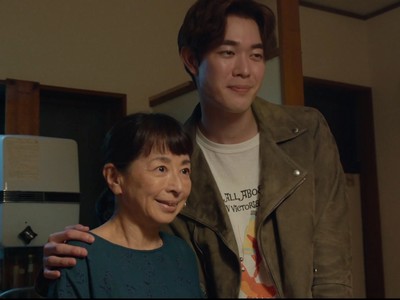
After his boyfriend's death, Kosuke spends time caring for Ryuta's mother. He visits Taeko frequently, buys household essentials, and helps with domestic chores. A part of his motivation comes from compassion. He wants to comfort this sick, lonely woman who recently lost her son. Another driving emotion comes from guilt. Kosuke blames himself for indirectly causing Ryuta's death. Supporting the bereaved mother is Kosuke's idea of penance, which Ryuta would have approved if he was still alive.
Taeko provides Kosuke with parental affection. Kosuke was close to his mom, but she died in his teens. In contrast, he has a cold relationship with his dad. I suspect Kosuke's closeted sexuality is the driving wedge between them. Kosuke lacks family warmth until he meets Ryuta's kind, empathetic mom. He feels at ease and can talk to her more openly than with his biological father. As they spend time together, Kosuke grows emotionally attached. He sleeps over, wears her child's clothes, and gives back massages. Kosuke sees Taeko as a surrogate parent and pours all his affection into her.
Taeko becomes Kosuke's substitute for his lover. When he gives Ryuta's monthly payments to her, it signifies she's the new beneficiary of Kosuke's love. Also, she allows Kosuke to dote on the missing mother figure in his life. He basks in her parental warmth. Soon, his attachment intensifies. He displays the same spending habits as before, using gifts and money to buy Taeko's affection. He also blurs boundaries and asks her to live together. What is his agenda? Does Kosuke genuinely want to care for her? Or is he treating her like a bandage for his emotional wounds?
What is love?
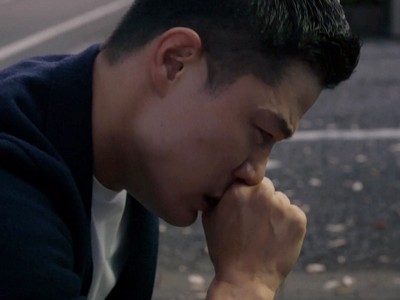
Fate is cruel. Taeko discovers she has untreatable cancer and will depart the world soon. While talking to Kosuke, she makes a pitiful plea. This dying senior doesn't want Kosuke to abandon her in the final moments of her life. Takeo implies that she wants Kosuke's affection. Please extend your love for Ryuta to me as well. Taeko makes an egotistical request, considering she has no legal or biological connection to Kosuke. Yet, she assigns an emotionally taxing obligation onto him. Love me, care for me, and stay with me until I die.
"I don't understand what love is," Kosuke responds in the context of Taeko's request. He doesn't know what it means to "love" Taeko and needs clarification. On a broader scale, his words allude to the movie's overarching theme. Kosuke has been confused about the meaning of love throughout the story. For a while, he expressed affection through gifts. Yet, the pursuit of material wealth pushed Ryuta to his death. Dropping money on the ground is a metaphor and a reminder of what broke him in the end. Kosuke is left questioning whether his idea of love placed a burden on his partner.
Taeko answers Kosuke's question about the definition of love. "As long as we feel you love us, that is enough." She gives one of the most philosophical quotes in the movie. There's no clear answer on how to love somebody. Love can be expressed through buying expensive gifts. Likewise, love can be blow-drying your partner's hair, changing careers to appease him, or staying with a bedridden patient until her death. Regardless of your method, the most important aspect is that the recipient feels your affection. Love comes from expression and understanding.
Egoist Movie Ending Explained
Ending
Sad ending
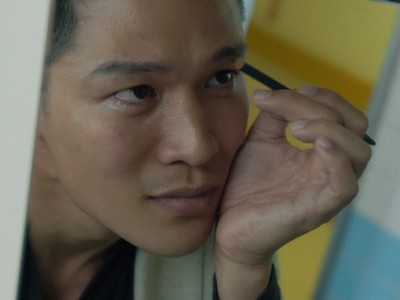
Egoist has a sad ending for Ryuta's mother, who is hospitalized and dying from terminal cancer. After her son's death, Taeko has no other family members to rely on. Kosuke agrees to be her caregiver, taking on an emotionally taxing obligation. His motivation is left ambiguous. Does he see her as a surrogate parent? Or is she a moral responsibility on behalf of his dead boyfriend? The movie makes us wonder whether he's driven by love, compassion, pity, or remorse.
Caring for a sick elder triggers Kosuke's past trauma. Since his mother died similarly, he revisits a painful experience. Also, Kosuke has grown attached to Ryuta's mom. After Ryuta's death, Kosuke transferred his affection to Taeko. Yet, he must cope with the impending loss of another loved one. It may be easier if Kosuke behaves selfishly and forgoes the responsibility for Taeko's well-being. He can choose to be an egoist, protect his mental health, and leave her to die alone. However, Kosuke loves Ryuta and Taeko too much. His devotion places an emotional burden on him.
The tragedy takes its toll on Kosuke, who breaks down in his mirror reflection. He only allows himself to cry for a few seconds. Kosuke knows he must put on a brave face before Taeko, who already suffers enough. His role is to support her, not to make her worry. Her needs come before his grief. Kosuke takes a deep breath and composes himself. Soon, a steely gaze replaces his tearful eyes. As Kosuke touches up his eyebrows, he wears cosmetic armour to disguise his pain. Moments later, Kosuke approaches Taeko's bedside and greets her confidently.
Taeko

Taeko doesn't explicitly tell Kosuke to look after her. However, she speaks pitifully and places an emotional burden on him. After announcing her diagnosis, she asks whether Kosuke loves her like he loves her son. The intent behind this question comes from a lonely woman who desires companionship. Abandonment has shaped Taeko's tragic life. Her cheating husband left for another woman. Her loyal son died unexpectedly. Taeko has no one left except Kosuke, and it scares her that she may lose him too.
On Kosuke's first hospital visit, Taeko clarified to the other patients that he was not her son. On subsequent visits, she proudly refers to him as her child. The new label indicates her growing fondness. In another chat, Taeko describes Kosuke's mother and Ryuta caring for each other in heaven. All of them will reunite like in-laws in the sky. It's another reference that Taeko considers him as part of her immortal family. Taeko makes this bold statement to emphasize her gratitude. She appreciates Kosuke for being her caregiver and wants him to know that he is loved.
The final scene shows Taeko attached to a ventilator. Her health has deteriorated. As the sun sets, Kosuke gets up to leave the hospital for the day. Taeko musters the strength to stop Kosuke and asks him to stay by her side. He smiles and obliges. The last shot focuses on Kosuke holding Taeko's hand tenderly. His gentle gesture is a poignant way of concluding the movie. As promised, Kosuke is there to provide emotional support. He gives her the comforting reassurance that she won't be alone. While she dies, Taeko feels his love emanating through their joined hands.
Kosuke
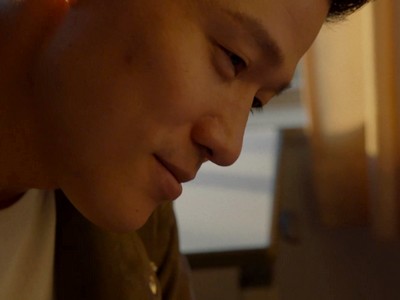
After Ryuta's death, Kosuke looks back on their relationship apologetically. He blames himself for imposing his will on Ryuta, who felt subliminal pressure to make money. Kosuke suspects his constant emphasis on material wealth burdened his boyfriend. Their power dynamics were lopsided. Kosuke always gave lavish gifts, while Ryuta only received free handouts. Kosuke's materialism made Ryuta feel he must work hard to repay his boyfriend's generosity.
Kosuke thought giving gifts was an effective way of expressing his love. He never asked Ryuta if he wanted these expensive presents. Material possessions brought him gratification, so he assumed they'd make his partner happy too. Ryuta appreciated his financial support. However, he didn't demand these freebies and always tried to decline. Kosuke's generosity fulfilled his self-worth more than it satisfied Ryuta's needs. The movie's title, Egoist, alludes to Kosuke's self-centredness in this relationship. His love for Ryuta is partially egocentric.
Kosuke redeems himself in the second half of the film. He puts aside his grief to help Taeko, who needs his support. Kosuke's kindness toward this dying woman proves his understanding of love has evolved. He focuses on her happiness rather than his self-gratification. Kosuke is capable of loving someone selflessly without personal gain. He is no longer an egoist. The last shot shows Taeko clasping his hand, indicating his affection has reached her. It's a reminder of the movie's poignant philosophy: "As long as we feel you love us, that is enough."
Egoist Movie Information
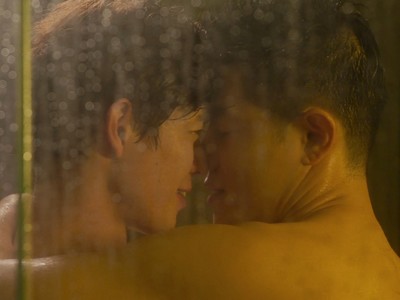
- Start Date October 27, 2022
- Movie Length 2 hours
Egoist is a Japanese movie that premiered at a film festival on October 27, 2022. It released in Japanese cinemas in February 10, 2023. It is a long movie, which you can finish in around 2 hours. Daishi Matsunaga (松永大司) is the movie director. The movie is adapted from a Japanese novel エゴイスト by Makoto Takayama (高山真).
Links
- Instagram Egoist Instagram
- MyDramaList Egoist MyDramaList
- Twitter Egoist Twitter
- Website Egoist website
- Wikipedia エゴイスト Wikipedia
Director
Daishi Matsunaga (松永大司) is a Japanese director. He has worked on the 2022 gay movie, Egoist.
Hi! Do you know where I can watch this in the US?
This sounds like a (fast then) slow burn that will linger in your memory, like Eternal Yesterday, Old Fashion Cupcake, and Drive my Car. Do international fans have an opportunity to see it? Is it streamable? Or likely to come to US theaters?
Anyone know where I can watch it?
Wow, BL Watcher, I hope your actual job is writing reviews… great one on this impressive movie and thanks in general for your website. It's a wonderful resource and I really appreciate the time and effort you put into it. One thing that I didn't read in your review, and maybe to add to the pondering about this movie:
Kosuke is constantly playing Tchaikovsky's 6th symphony. That symphony spells 'doom' like no other. When I heard that first movement in the movie I was already like 'oh oh, this isn't gonna end happy!'. But in the movie Kosuke doesn't get beyond the 3rd movement of the symphony (at least not as far as I could tell).
One could perhaps state that Kosuke is actually living the 4th movement (which is one of the most depressing pieces of music ever written – grief indeed… Tchaikovsky died soon after the premiere, under unclear circumstances). Anyway, if you don't know the music, perhaps it adds some additional layer to the story if you take a listen.
You are truly amazing,I really loved you review, I used to be someone who always gives gift to all my friends and family, but i never thought if he or she wants it or need it before buying it, this movie gives an great impact on me because I'm like kosuke, but i dont know what is wrong with me before reading your review, you given an insightful view to this movie, I loved this movie and your review, keep going ❤
i would like to know the song Kosuke sings in his coat of many colours…it is something i would love to learn…tino pa…all the way from aotearoa(nz)